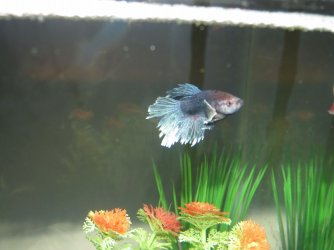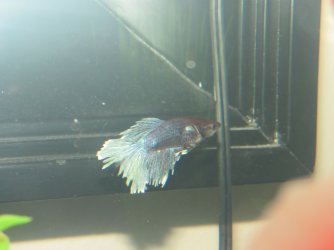You are using an out of date browser. It may not display this or other websites correctly.
You should upgrade or use an alternative browser.
You should upgrade or use an alternative browser.
Can someone help me identify my blue bettas gender?
- Thread starter entefan_li
- Start date
The April FOTM Contest Poll is open!

🏆 Click to vote! 🏆
betta fish
Fish Herder
That's a male.
entefan_li
New Member
The fins are far too developed to be a female, so it is a male. His fins look pretty tattered as well, I hope you are taking care of that?
I started noticing that yesterday. How can I take care of that?
Tell us about his tank, how big is it and what is the water changing schedule? What is the temp set at, water parameters etc? I'd say there's some fin rot going on, which is usually caused by bad water quality. The best way to treat it is to keep the water clean and warm.
There is no way that happened in a couple days, looks like it's been going on for a couple weeks to me. The fins don't look like they were being torn off, like in fin nipping, but rather eaten away at.
There is no way that happened in a couple days, looks like it's been going on for a couple weeks to me. The fins don't look like they were being torn off, like in fin nipping, but rather eaten away at.
Tyler_Fishman
Fish Crazy
- Joined
- Feb 21, 2017
- Messages
- 293
- Reaction score
- 52
Male. The body structure is that of a male, his anal fin is not pointed And the tip a female would be much thicker and be full of eggs. And clearly have an egg spot
entefan_li
New Member
Tell us about his tank, how big is it and what is the water changing schedule? What is the temp set at, water parameters etc? I'd say there's some fin rot going on, which is usually caused by bad water quality. The best way to treat it is to keep the water clean and warm.
There is no way that happened in a couple days, looks like it's been going on for a couple weeks to me. The fins don't look like they were being torn off, like in fin nipping, but rather eaten away at.
I got him about 1 week ago. Hes been in a 10 gallon Aquarium. Im thinking it could be the water quality. I feel so bad now that I see him like that. Started noticing other female bettas that I have and two of them have their back fin slightly tattered but he's the worse. What do I have to do? Are they going to stay like that?
Started noticing other female bettas that I have and two of them have their back fin slightly tattered but he's the worse
The male is NOT in the tank with females is he?
Please answer Nick's question, are the betta living in the same tank? Betta are notoriously aggressive and males will even harass a female to death unless he's interested in mating. If they are together they need to be separated immediately.I got him about 1 week ago. Hes been in a 10 gallon Aquarium. Im thinking it could be the water quality. I feel so bad now that I see him like that. Started noticing other female bettas that I have and two of them have their back fin slightly tattered but he's the worse. What do I have to do? Are they going to stay like that?
Please also answer Byron's questions about your tank set up and water parameters. If we can figure out what is wrong we can instruct you on how to fix it.
First off do a 50% water change in each of your betta's tanks and make sure you siphon the gravel to remove any excess organic matter. Replace the water with conditioned water, NOT tap water without water conditioner, and that the water is as close to the temperature as the tank water as possible. Rapid fluctuations in temperature cause a great amount of stress on a fish and stress leads to illness.
Please tell us your water parameters. Nitrates, nitrites, ammonia, Ph, and alkalinity. You can purchase an API freshwater master test kit and follow the instructions. Another alternative is to go to a local pet store that offers free water testing when you bring a sample of your tank water in. Make sure you get specific numbers and that you write them all down.
Please also answer the following questions.
1) How long have you had this tank set up before you placed your betta inside? Is it properly cycled?
2) What do you feed your betta, how much food do you give him, and how often?
3) How often and at what quantity do you do water changes and gravel cleaning? You should be doing at least 30% water changes twice a week or 50% water changes once a week for an established tank. By established I mean cycled, and by cycled I mean you allowed a healthy bacteria colony to grow before placing your betta in the tank. Here is a basic guide that explains the importance of cycling. While not in great detail, it offers a bit of insight, you can find more helpful links if interested. http://aquariuminfo.org/cycling.html.
Fish naturally secrete ammonia and their waste/decomposing food causes nitrates and nitrites to build up in the water. Without an established bacteria colony to absorb these things it causes dangerous levels of ammonia, nitrate, and nitrites to build up in the water and the water parameters spike. This means that the fish is basically being poisoned to death.
4) Is your tank heated and properly filtered?
5) Are there any other tank mates we need to know about? Betta are extremely territorial and cannot always live in community tanks, and never with other betta/flashy fish/ or territorial fish. A betta will perceive any of these as a threat and will either attack and harass the fish to death or die trying in the process. Sometimes females can be kept in a sorority, but I've never attempted it, so don't ask me how. Just know that it doesn't always work and you need to be well researched before you attempt it.
GobyMaster11276
Fish Crazy
What type of filter do you have?
Latest Discussions
- Replies
- 1
- Views
- 23
- Replies
- 5
- Views
- 51
- Replies
- 2
- Views
- 59
- Replies
- 1
- Views
- 45
- Replies
- 1
- Views
- 65
trending
-
-
-
-
-
F-1 Angel... a bit nervous... it'll be my 1st F-1 fish...
- Started by Magnum Man
- Replies: 17
Staff online
-
EssjayModerator
Members online
Total: 432 (members: 5, guests: 427)


